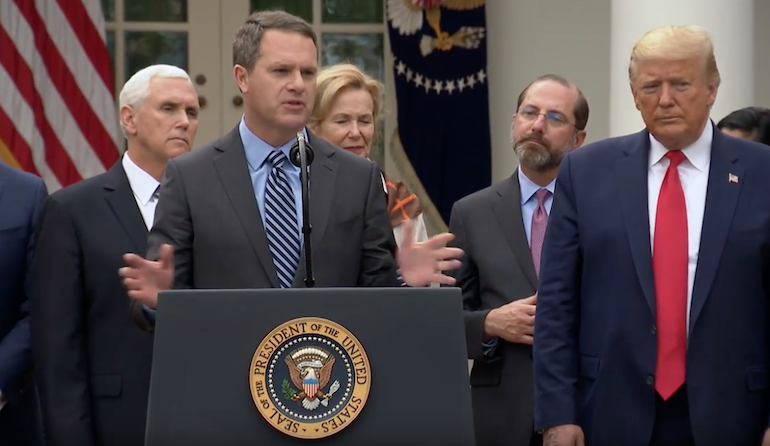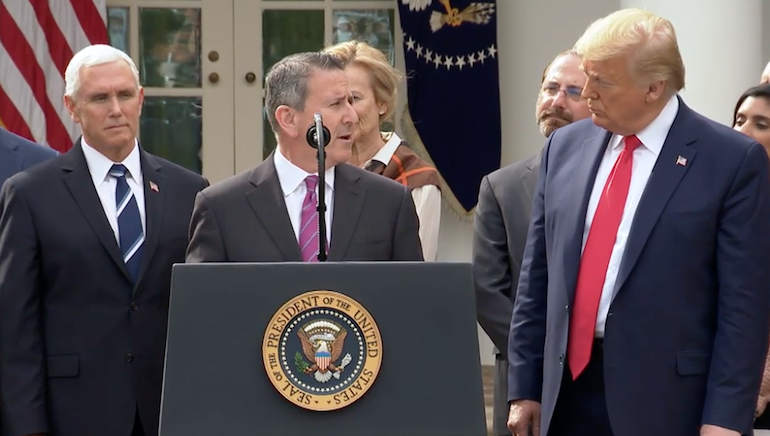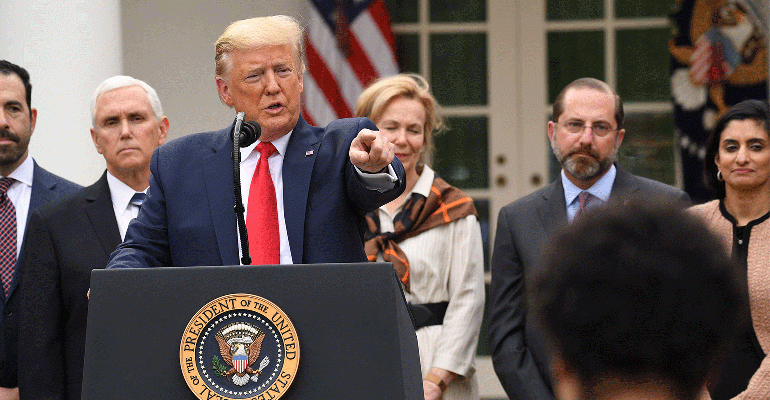Follow Supermarket News' coronavirus coverage at our dedicated news page.
President Donald Trump on Friday designated the rapid spread of novel coronavirus (COVID-19) as a national emergency, freeing up billions of dollars in emergency funds.
On the day after the worst single-day drop since 1987, all three major financial indexes extended gains in late trading as President Trump's address appeared to at least temporarily calm investor nerves. The Dow jumped 1,985 points, while the S&P 500 and NASDAQ 100 were both up more than 7% from Thursday.
President Trump’s order on Friday came as COVID-19 cases (confirmed and presumptive-positive) hit 1,629 in 46 states and the District of Columbia, with 41 deaths overall, according to the Centers for Disease Control and Prevention (CDC). States with the most reported cases are Washington (457), New York (325), California (224) and Massachusetts (108).
“To unleash the full power of the federal government, with this effort today, I am officially declaring a national emergency,” Trump said in a late afternoon press conference at the White House. “The action I am taking will open up access to up to $50 billion for states, territories and localities in our shared fight against this disease.
“In furtherance of the order, I’m urging every state to set up emergency operations centers effective immediately,” he added. “I’m also asking every hospital in this country to activate its emergency preparedness plan so that they can meet the needs of Americans everywhere.”
Trump noted that the action will “confer broad new authority” to Secretary of Health and Human Services (HHS) Alex Azar. The move will enable Azar to waive health care-related regulatory restrictions to give hospitals, doctors and other medical personnel “maximum flexibility to respond to the virus and care for patients,” including increased use of telehealth services, the president said.
In addition, limits on physician licenses will be relaxed so doctors can assist health care providers in other states. Hospitals also will be able to accommodate more beds and lengthen patient stays, as well as have more ability to add medical staff as needed.
“We’ll remove or eliminate every obstacle necessary to deliver our people the care that they need and are entitled to,” Trump said. “No resource will be spared.”
Perhaps most important, Trump said the federal government is now partnering with the private sector to “vastly increase and accelerate our capacity to test for the coronavirus.”

"We’ll stay involved and do everything we can from a supply-chain point of view to be of assistance," Walmart CEO Doug McMillon (at podium) said at the press conference.
“We want to make sure that those who need a test can get a test very quickly, safely and conveniently,” he said, noting that the Food and Drug Administration expedited an approval of a new coronavirus test from Switzerland-based pharmaceutical giant Roche.
“We therefore expect up to a half-million additional tests will be available early next week,” Trump said, adding that locations will be announced likely on Sunday evening. Another 1.4 million tests also are slated to become available next week, and 5 million within a month, as the FDA expedites approval of a coronavirus test from Thermo Fisher Scientific, he said.
The administration also is working to give more flexibility to states to approve labs for coronavirus testing as well as ease rules on who qualifies for testing. HHS, too, recently announced it's providing funding to speed the development of two rapid diagnostic tests.
“At the same time, we’ve been in discussions with pharmacies and retailers to make drive-through tests available in critical locations identified by public health professionals. The goal is for individuals to be able to drive up and be swabbed without having to leave your car,” the president said.
Google, meanwhile, is setting up a website to enable people to determine if they need a COVID-19 test and, if so, where to find a local testing site. “Our overriding goal is to stop the spread of the virus and to help all Americans who have been impacted by this,” said Trump.
At the press conference, the chief executives of Walmart, Target and Walgreens all said they had agreed to make facilities available for testing.

Target Chairman and CEO Brian Cornell (center) said, "Today we’re focused on a common competitor, and that’s defeating the spread of the coronavirus."
"We’ve been asked to make portions of our parking lot available in select locations in the beginning, and scaling over time as supply increases, so that people can experience the drive-through experience that the president described," Walmart CEO Doug McMillon said at the event. "We’ll stay involved and do everything we can from a supply-chain point of view to be of assistance."
Walgreens President Richard Ashworth said, "We’re happy to stand in here and help in communities all across America. Because a lot of times, when we have natural disasters, our stores are a beacon in the community, and this situation is no different. So we look forward to partnering with the CDC, the administration, HHS and the task force, and specifically with the vice president, who’s doing such a fantastic job. We’re ready to engage and help."
Also at the event was Thomas Moriarty, chief policy and external affairs officer for CVS Health. "We have been focused, since the start, of making sure our patients and the customers we serve have the information they need and the safety they need as well," he said. "We are committed to working with the administration and local public health officials to make this work as well."
Target Chairman and CEO Brian Cornell noted that retailers are aligned in their commitment to help the public in its time of need.
"Mr. President, thank you for inviting us here today, along with our colleagues from Walmart and Walgreens and our partners at CVS. Normally, you’d view us as competitors, but today we’re focused on a common competitor, and that’s defeating the spread of the coronavirus. And we look forward to working with the administration to do our fair share to alleviate this growing threat," Cornell said. "In the near term, we’re all committed to making sure we’re keeping our stores open to serve the American consumer who is rapidly stocking up on household essentials, key food and beverage items that they need during this time; making sure we run safe stores; and creating an environment that’s safe for our team members, making sure that they feel supported during this very critical time."
Anthony Fauci, director of the National Institute of Allergy and Infectious Diseases (NIAID), said the administration’s action will help the United States “stay ahead of the curve” as more coronavirus cases emerge across the country.
“What you’re seeing now with this order is that we’re going to be able to remove the constraints so that people at the state and local levels and individual physicians — all the way up through the federal government — can do everything they possibly can to implement the things we’ve been talking about, the containment, the mitigation,” said Fauci.
“We still have a long way to go. There are going to be many more cases, but we’ll take care of that,” he said. “What’s going on here today is going to help it to end sooner than it would have.”
Upon the administration's announcement to declare a national emergency to deal with the nationwide spread of coronavirus, grocery industry trade group FMI-The Food Industry Association applauded the move.
“With increasing uncertainty regarding COVID-19 in the U.S., shoppers seek to reestablish control of their environment – and our grocery supply chain is working to support that desire for stability through its adaptability, flexibility and resilience," FMI President and CEO Leslie Sarasin said in a statement.
"We live in a global economy, which is evident every day in the aisles of a grocery store," she added. "As this situation progresses, the grocery supply chain will be tested, but built-in efficiencies, strong trading partner relationships, nimble technology and service relationships, and genuine concern for our customers will be manifested in the resilience of this supply chain.”





